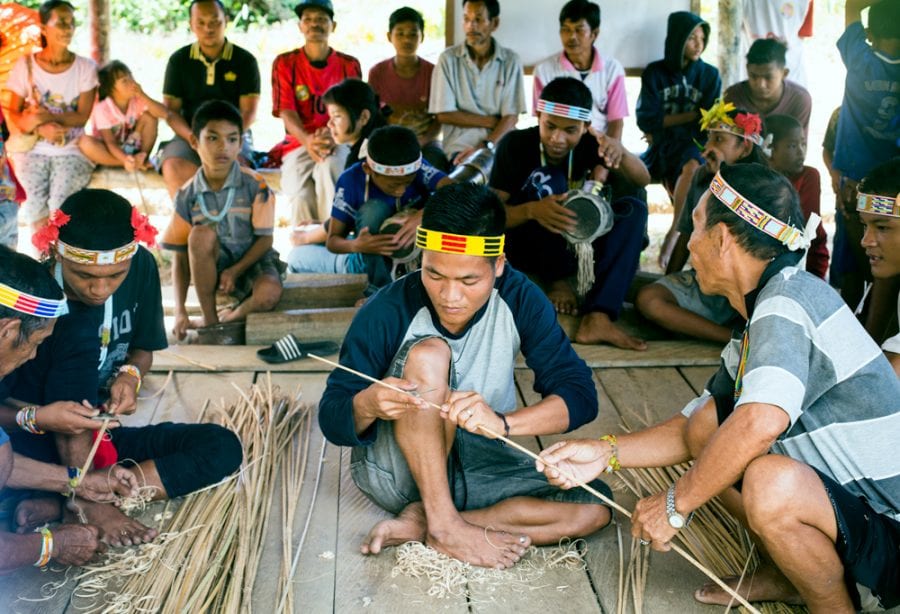It’s official. As of june this year, we are heading to Mentawai islands in Indonesia to kick-off our 2nd self-documentation project, led by anthropologist and documentary photographer Steyn Hoogakker. The Mentawai Self Documentation Project is focused around an indigenous led education program meant to re-connect the communities on the island with their ancestral knowledge. Sinchi’s involvement consists of documentation of this education program and donating equipment and workshops towards the program to enhance self documentation in the future.
The so called Cultural and Environmental Education Program (CEEP), run by YPBM and funded through the Indigenous Education Foundation, is very unique in its kind. Its a non-formal, extra-curricular activity and is held during the afternoon between the hours of 2-6pm. Formal schooling hours are timetabled between 8am-12pm Monday to Saturday and students are encouraged to attend both, which most of them do. Classes are taught by both male and female sikerei (shamans) and involve subjects like: Mentawai history, culture and forest environment, Including topics such as : storytelling, language, singing, dancing, taboos and mythology; the identification, gathering and preparation of natural medicines and other important resources; propagation of food and plant resources; hunting, techniques for farming animals such as pigs and chickens; techniques for using a machete and other survival tools, the making of cultural paraphernalia and survival items such as weaving baskets, mats, jewellery, clothing, carving wooden items and hunting equipment; building clan long-houses, roofing techniques and so forth.
The importance of the program lays within the history of the island and the overhaul of traditional Mentawai culture by outside influence. As early as 1954, under Indonesia’s goal of national unity and cultural adaptation, the National Government began introducing development and civilization programmes designed to ‘integrate the tribal groups into the social and cultural mainstream of the country’ (Persoon, 2004). This, for native Mentawai, meant the eradication of Arat Sabulungan practice; the forced surrender, burning and destruction of possessions used to facilitate cultural or ritual behaviour; and their Sikerei (shamans) being disrobed, beaten, and forced into slave labour and imprisonment.
By the late 1980’s, after loggers had devastated the forests of Sipora, North and South Pagai, and – prior to being challenged by a selection of international organizations In 1980, WWF (world wildlife fund) published a report entitled ‘Saving Siberut’ which, along with the support of other organizations – primarily UNESCO and Survival International – and other additional international interest, helped persuade the Indonesian government to cancel logging concessions and declare the forests of Siberut a biosphere reserve. – were also in the process of achieving the same on Siberut, the Government’s pressure on resettlement was somewhat relaxed (primarily due to the steady flow of tourism the indigenous community attracted). With this, the people in the Mentawai found that they were once again free to practice their native cultural activities – in areas away from the villages.
However, by this point, and as it remains today, the number of indigenous people still actively practicing the cultural customs, rituals and ceremonies of Arat Sabulungan had already been limited to a very small population of clans primarily located around the Sarereiket and Sakuddei regions in the south of Siberut Island.
Due to the above developments, it is of high importance and priority to grassroots organizations to re-introduce Mentawai customs on the island. The CEEP aims to do just that and it is our incentive to support. Sinchi collaborates on this project with the indigenous led organization Yayasan Pendidikan Budaya Mentawai, Sam Lee and Rob Henry from the Indigenous Education Foundation (check out their project and documentary As Worlds Divide) and Steyn Hoogakker from Impact Journey to document the process from inside out, by donating photo cameras, tripods a laptop and recording devices to the communities and giving workshops in photography and sound recording. The objectives are:
- The facilitation of workshops in visual self-documentation through photography to a group of an estimated 6 to 12 participants per workshop, during a period of 3-4 weeks , taking place in June 2019,
- The recording of the above process includes photo, video and (sound) recordings of focus group discussions,
- Analysis of data to be used for the CEEP and the future targets of the program,
- The recording of traditional songs, myths and tales,
- The facilitation of a travelling workshop and exhibition about the progress of the Mentawai Education Program as a blueprint for self-documentation and self-determinations within indigenous communities, consisting of both the works of the workshop participants AND the work of our workshop facilitators Steyn Hoogakker (anthropologist and documentary photographer) and Palmer Keen (ethno-musicologist); and first-contact anthropologist Reimar Schefold.
Photo copyright: YPBM & Indigenous Education Foundation. Depicted is the basket weaving subject of the CEEP program.

